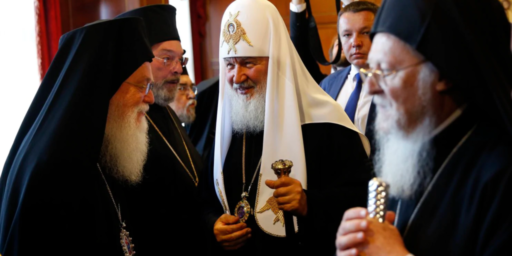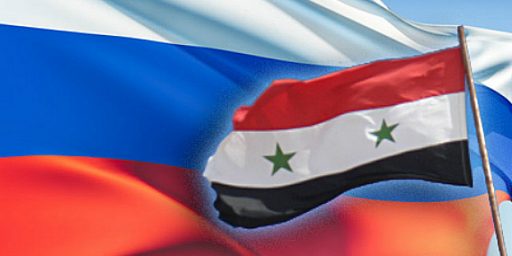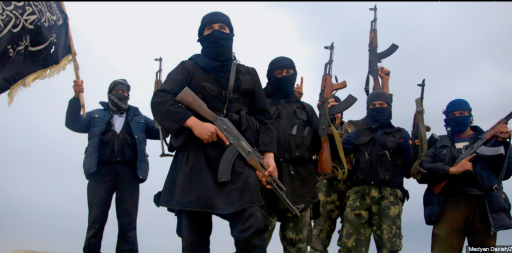Five Questions for Muslims
Dennis Prager poses, “Five questions non-Muslims would like answered” in an LAT op-ed this morning:
THE RIOTING IN France by primarily Muslim youths and the hotel bombings in Jordan are the latest events to prompt sincere questions that law-abiding Muslims need to answer for Islam’s sake, as well as for the sake of worried non-Muslims.
Here are five of them:
(1) Why are you so quiet? […]
(2) Why are none of the Palestinian terrorists Christian? […]
(3) Why is only one of the 47 Muslim-majority countries a free country? […]
(4) Why are so many atrocities committed and threatened by Muslims in the name of Islam? […]
(5) Why do countries governed by religious Muslims persecute other religions? […]
The answers would indeed be illuminating.
My sense is that the answers are cultural rather than theological. A strict reading of the Christian bible can and has been used as a justification of repression and violence every bit as much as the Koran. But, as Samuel Huntington pointed out long ago in his “Clash of Civilizations” article [full text here], the West had several transformative events that the rest of the world missed out on.
Western ideas of individualism, liberalism, constitutionalism, human rights, equality, liberty, the rule of law, democracy, free markets, the separation of church and state, often have little resonance in Islamic, Confucian, Japanese, Hindu, Buddhist or Orthodox cultures. Western efforts to propagate each ideas produce instead a reaction against “human rights imperialism” and a reaffirmation of indigenous values, as can be seen in the support for religious fundamentalism by the younger generation in non-Western cultures. The very notion that there could be a “universal civilization” is a Western idea, directly at odds with the particularism of most Asian societies and their emphasis on what distinguishes one people from another.
[…]
As the ideological division of Europe has disappeared, the cultural division of Europe between Western Christianity, on the one hand, and Orthodox Christianity and Islam, on the other, has reemerged. The most significant dividing line in Europe, as William Wallace has suggested, may well be the eastern boundary of Western Christianity in the year 1500. This line runs along what are now the boundaries between Finland and Russia and between the Baltic states and Russia, cuts through Belarus and Ukraine separating the more Catholic western Ukraine from Orthodox eastern Ukraine, swings westward separating Transylvania from the rest of Romania, and then goes through Yugoslavia almost exactly along the line now separating Croatia and Slovenia from the rest of Yugoslavia. In the Balkans this line, of course, coincides with the historic boundary between the Hapsburg and Ottoman empires. The peoples to the north and west of this line are Protestant or Catholic; they shared the common experiences of European history — feudalism, the Renaissance, the Reformation, the Enlightenment, the French Revolution, the Industrial Revolution; they are generally economically better off than the peoples to the east; and they may now look forward to increasing involvement in a common European economy and to the consolidation of democratic political systems. The peoples to the east and south of this line are Orthodox or Muslim; they historically belonged to the Ottoman or Tsarist empires and were only lightly touched by the shaping events in the rest of Europe; they are generally less advanced economically; they seem much less likely to develop stable democratic political systems. The Velvet Curtain of culture has replaced the Iron Curtain of ideology as the most significant dividing line in Europe. As the events in Yugoslavia show, it is not only a line of difference; it is also at times a line of bloody conflict.
Conflict along the fault line between Western and Islamic civilizations has been going on for 1,300 years. After the founding of Islam, the Arab and Moorish surge west and north only ended at Tours in 732. From the eleventh to the thirteenth century the Crusaders attempted with temporary success to bring Christianity and Christian rule to the Holy Land. From the fourteenth to the seventeenth century, the Ottoman Turks reversed the balance, extended their sway over the Middle East and the Balkans, captured Constantinople, and twice laid siege to Vienna. In the nineteenth and early twentieth centuries at Ottoman power declined Britain, France, and Italy established Western control over most of North Africa and the Middle East.
[…]
This centuries-old military interaction between the West and Islam is unlikely to decline. It could become more virulent. The Gulf War left some Arabs feeling proud that Saddam Hussein had attacked Israel and stood up to the West. It also left many feeling humiliated and resentful of the West’s military presence in the Persian Gulf, the West’s overwhelming military dominance, and their apparent inability to shape their own destiny. Many Arab countries, in addition to the oil exporters, are reaching levels of economic and social development where autocratic forms of government become inappropriate and efforts to introduce democracy become stronger. Some openings in Arab political systems have already occurred. The principal beneficiaries of these openings have been Islamist movements. In the Arab world, in short, Western democracy strengthens anti-Western political forces. This may be a passing phenomenon, but it surely complicates relations between Islamic countries and the West.
Those relations are also complicated by demography. The spectacular population growth in Arab countries, particularly in North Africa, has led to increased migration to Western Europe. The movement within Western Europe toward minimizing internal boundaries has sharpened political sensitivities with respect to this development. In Italy, France and Germany, racism is increasingly open, and political reactions and violence against Arab and Turkish migrants have become more intense and more widespread since 1990.
Indeed it has.





Yes, history proves that religious bias can be combined with racism and other elements to create long and bloody conflicts. A student of history might find this a pattern to avoid, and might ask which moves will break the cycle, rather than reinforce it?
I don’t believe the English/Irish, or Israeli/Palestinian, answer is a good one – lifelong, indeed multigenerational, patterns of violence.
I’m afraid that the neocon plan was to take up that kind of battle, and launch a decades long American/Arab conflict …
So sad.
BTW, do the French Cleric’s calls for piece, or the demonstrations in Jordan against terrorism count?
Maybe the way to break the cycle is to concentrate and reinforce that news, rather than focus on the conflict. Certainly, when we identify agreements between peoples we provide less fuel for the fire.
With the exception of the first question, how a Muslim supposed to answer? The other four are best put to academic types. The third question strikes me as particularly pointless, as Muslims are the people being ruled in the other 46 countries.
There is cure for being ruled: If Muslims are clever enought to escape detection in so many terror attacks, there s no reason that they cannot use many of the same techniques on their own leaders. Isn’t that what we did – use the techniques we (frontiersmen) were adept at to overthrow our “King?”
If they wished to be free they must make the sacrifice!
Will you please stop saying riots in France is the fault of islam ?
It’s one of the two most ridiculous theory i heard on the causes of the riots.
The second one is that’s because of polygamy, because parents have so many children that they can’t look after them correctly …
When I heard that I couldn’t stop laughing.